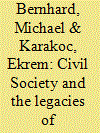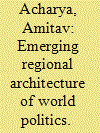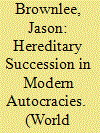|
|
|
Sort Order |
|
|
|
Items / Page
|
|
|
|
|
|
|
| Srl | Item |
| 1 |
ID:
080168


|
|
|
|
|
| Publication |
2007.
|
| Summary/Abstract |
The literature on civil society in postcommunist regimes highlights its weakness as compared with civil society in other democracies. In this article the authors make a general argument on how different patterns of antecedent dictatorship affect the development of civil society across a range of democracies. They examine the slow emergence of two behaviors associated with a robust civil society-participation in organizational life and in protest-and explain variation across countries as a function of regime history. They draw their individual-level data from the World Values Survey and analyze the behavior of over forty-one thousand citizens from forty-two democracies. Using methods of hierarchical linear modeling to control for both national-level and individual-level factors, the authors find that different types of dictatorship and variation in their duration produce different negative legacies for the development of civil society
|
|
|
|
|
|
|
|
|
|
|
|
|
|
|
|
| 2 |
ID:
080167


|
|
|
|
|
| Publication |
2007.
|
| Summary/Abstract |
Although Taiwan is widely regarded as one of the purest examples of middle-class-driven democratization, this article suggests that the conventional accent on the middle class is misplaced. Instead, the true heroes in the struggle for democracy were the island's working classes, although proper recognition of this fact requires an empirically derived understanding of class that looks beyond formal labor politics. Although the author does not dispute the importance of ethnicity in Taiwanese politics, the findings clearly indicate that ethnic identity was in itself a class issue, as the island's working classes were the most deeply attached to a nativist Taiwanese identity, while members of the middle classes were far more successfully assimilated into the elite "national" culture. The Taiwanese experience thus provides a reminder that many political phenomena apparently framed in ethnic, sectarian terms are in fact undergirded by essentially class-based grievances
|
|
|
|
|
|
|
|
|
|
|
|
|
|
|
|
| 3 |
ID:
080171


|
|
|
|
|
| Publication |
2007.
|
| Summary/Abstract |
This article examines the importance of regions in shaping world order. Reviewing two recent books that claim that the contemporary world order is an increasingly regionalized one, the author argues that regions matter to the extent they can be relatively autonomous entities. While both books accept that regions are social constructs, their answer to the question of who makes regions reflects a bias in favor of powerful actors. A regional understanding of world politics should pay more attention to and demonstrate how regions resist and socialize power-at both global and regional levels-rather than simply focusing on how powers construct regions. Power matters, but local responses to power, including strategies of exclusion, resistance, socialization, and binding, matter more in understanding how regions are socially constructed. The article elaborates on various types of responses to power from both state and societal actors in order to offer an inside-out, rather than outside-in, perspective on the regional architecture of world politics
|
|
|
|
|
|
|
|
|
|
|
|
|
|
|
|
| 4 |
ID:
080170


|
|
|
| 5 |
ID:
080169


|
|
|
|
|
| Publication |
2007.
|
| Summary/Abstract |
Why do secular states pursue substantially different policies toward religion? The United States, France, and Turkey are secular states that lack any official religion and have legal systems free from religious control. The French and Turkish states have banned students' headscarves in public schools, whereas the U.S. has allowed students to wear religious symbols and attire. Using the method of process tracing, the author argues that state policies toward religion are the result of ideological struggles. In France and Turkey the dominant ideology is "assertive secularism," which aims to exclude religion from the public sphere, while in the U.S., it is "passive secularism," which tolerates public visibility of religion. Whether assertive or passive secularism became dominant in a particular case was the result of the particular historical conditions during the secular state-building period, especially the presence or absence of an ancien régime based on a marriage of monarchy and hegemonic religion
|
|
|
|
|
|
|
|
|
|
|
|
|
|
|
|
|
|
|
|
|